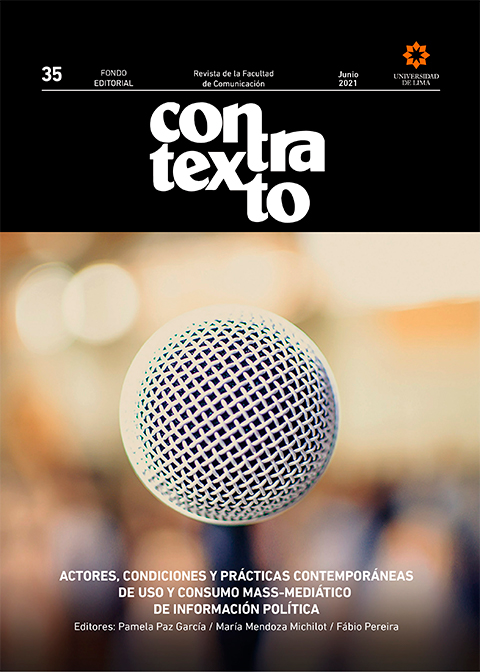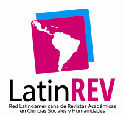Whatsapp, comunicação móvel e participação política: um estudo quantitativo emno Equador
DOI:
https://doi.org/10.26439/contratexto2021.n035.4839Palavras-chave:
WhatsApp, participação política offline, participação política online, comunicação política móvel, EquadorResumo
Este trabalho analisa a relação entre diferentes usos políticos do WhatsApp e os comportamentos de participação política no contexto equatoriano. Para um entendimento mais detalhado, a participação política foi classificada em três modos específicos de ação: offline convencional, protesto offline e online. Por sua vez, o uso político do WhatsApp foi dividido em 3 tipos: a) consumo de informação política, b) expressão e discussão política, e c) contato com grupos políticos online. Usando dados de pesquisas aplicadas no Distrito Metropolitano de Quito (Equador) em 2018, as análises de regressão múltipla desenvolvidas indicam que o consumo de informações políticas via WhatsApp influencia significativamente nas ações de protesto político.
Contudo, a expressão e a discussão política através desta aplicação móvel produzem efeitos mobilizadores em todas as modalidades de participação analisadas. Efeito consistente que também é observado quando o WhatsApp é usado para interagir com grupos políticos online. A seção final discute os resultados do estudo, levando em consideração pesquisas anteriores sobre os efeitos democráticos do WhatsApp.
Downloads
Referências
Baek, Y. M. (2015). Political mobilization through social network sites: the mobilizing power of political messages received from SNS friends. Computers in Human Behavior, 44, 12-19. https://doi.org/10.1016/j.chb.2014.11.021
Bakshy, E., Messing, S., y Adamic, L. A. (2015). Exposure to ideologically diverse news and opinion on Facebook. Science, 348(6239), 1130-1132. https://doi.org/10.1126/science.aaa1160
Boulianne, S. (2015). Social media use and participation: a meta-analysis of current research. Information, Communication & Society, 18(5), 524-538. https://doi.org/10.1080/1369118X.2015.1008542
Boulianne, S. (2020). Twenty years of digital media effects on civic and political participation. Communication Research, 47(7), 947-966. https://doi.org/10.1177/0093650218808186
Boulianne, S., y Theocharis, Y. (2020). Young people, digital media, and engagement: a meta-analysis of research. Social Science Computer Review, 38(2), 111-127.https://doi.org/10.1177/0894439318814190
Campbell, S. W., y Kwak, N. (2010). Mobile communication and civic life: linking patterns of use to civic and political engagement. Journal of Communication, 60(3), 536-555. https://doi.org/10.1111/j.1460-2466.2010.01496.x
Campbell, S. W., y Kwak, N. (2011). Political involvement in “mobilized” society: the interactive relationships among mobile communication, network characteristics, and political participation. Journal of Communication, 61(6), 1005-1024. https://doi.org/10.1111/j.1460-2466.2011.01601.x
Chan, M., Chen, H. T., y Lee, F. L. (2017). Examining the roles of mobile and social media in political participation: a cross-national analysis of three Asian societies using a communication mediation approach. New Media & Society, 19(12), 2003-2021. https://doi.org/10.1177/1461444816653190
Cho, J., Shah, D. V., McLeod, J. M., McLeod, D. M., Scholl, R. M., y Gotlieb, M. R. (2009). Campaigns, reflection, and deliberation: advancing an O-S-R-O-R model of communication effects. Communication Theory, 19(1), 66-88. https://doi.org/10.1111/j.1468-2885.2008.01333.x
Church, K., y De Oliveira, R. (2013). What’s up with WhatsApp?: comparing mobile instant messaging behaviors with traditional SMS. En Proceedings of the 15th International Conference on Human-Computer Interaction with Mobile Devices and Services (pp. 352-361). https://dl.acm.org/citation.cfm?id=2493225
Conroy, M., Feezell, J. T., y Guerrero, M. (2012). Facebook and political engagement: a study of online political group membership and offline political engagement. Computers in Human Behavior, 28(5), 1535-1546. https://doi.org/10.1016/j.chb.2012.03.012
DiGrazia, J. (2014). Individual protest participation in the United States: conventional and unconventional activism. Social Science Quarterly, 95(1), 111-131. https://doi.org/10.1111/ssqu.12048
Druckman, J. N., y Nelson, K. R. (2003). Framing and deliberation: how citizens’ conversations limit elite influence. American Journal of Political Science, 47(4), 729-745. https://doi.org/10.1111/1540-5907.00051
Effing, R., Van Hillegersberg, J., y Huibers, T. (2011). Social media and political participation: are Facebook, Twitter and YouTube democratizing our political systems? En International Conference on Electronic Participation (pp. 25-35). Springer. https://doi.org/10.1007/978-3-642-23333-3_3
Ekman, J, y Amnå, E. (2012). Political participation and civic engagement: towards a new typology. Human Affairs, 22(3), 283-300. https://doi.org/10.2478/s13374-012-0024-1
Eveland, W. P. (2001). The cognitive mediation model of learning from the news: evidence from nonelection, off-year election, and presidential election contexts. Communication Research, 28(5), 571-601. https://doi.org/10.1177/009365001028005001
Eveland, W. P. (2004). The effect of political discussion in producing informed citizens: the roles of information, motivation, and elaboration. Political Communication, 21(2), 177-193. https://doi.org/10.1080/10584600490443877
Fenton, N., y Barassi, V. (2011). Alternative media and social networking sites: the politics of individuation and political participation. The Communication Review, 14(3), 179-196. https://doi.org/10.1080/10714421.2011.597245
Gazit, T., y Aharony, N. (2018). Factors explaining participation in WhatsApp groups: an exploratory study. Aslib Journal of Information Management, 70(4), 390-413. https://doi.org/10.1108/AJIM-03-2018-0053
Gibson, R., y Cantijoch, M. (2013). Conceptualizing and measuring participation in the age of the internet: is online political engagement really different to offline? The Journal of Politics, 75(3), 701-716. https://doi.org/10.1017/S0022381613000431
Gil de Zúñiga, H., Ardèvol-Abreu, A., y Casero-Ripollés, A. (2019). WhatsApp political discussion, conventional participation and activism: exploring direct, indirect and generational effects. Information, Communication & Society, 24(2), 201-218. https://doi.org/10.1080/1369118X.2019.1642933
Gil de Zúñiga, H., Jung, N., y Valenzuela, S. (2012). Social media use for news and individuals’ social capital, civic engagement and political participation. Journal of Computer-Mediated Communication, 17(3), 319-336. https://doi.org/10.1111/j.1083-6101.2012.01574.x
Gil de Zúñiga, H., Molyneux, L., y Zheng, P. (2014). Social media, political expression, and political participation: panel analysis of lagged and concurrent relationships. Journal of Communication, 64(4), 612-634. https://doi.org/10.1111/jcom.12103
Gil de Zúñiga, H., y Valenzuela, S. (2011). The mediating path to a stronger citizenship: online and offline networks, weak ties, and civic engagement. Communication Research, 38(3), 397-421. https://doi.org/10.1177/0093650210384984
Hardy, B. W., y Scheufele, D. A. (2005). Examining differential gains from Internet use: comparing the moderating role of talk and online interactions. Journal of Communication, 55(1), 71-84. https://doi.org/10.1111/j.1460-2466.2005.tb02659.x
Hollander, B. A. (1995). The influence of talk radio on political efficacy and participation. Journal of Radio Studies, 3(1), 23-31. https://doi.org/10.1080/19376529509361971
Hopke, J. E., Gabay, I., Kim, S. C., y Rojas, H. (2016). Mobile phones and political participation in Colombia: mobile Twitter versus mobile Facebook. Communication and the Public, 1(2), 159-173. https://doi.org/10.1177/2057047316642607
Instituto Nacional de Estadísticas y Censos (2018). Proyecciones poblacionales [fichero de datos]. https://bit.ly/2QEfkDm
Jung, N., Kim, Y., y Gil de Zúñiga, H. (2011). The mediating role of knowledge and efficacy in the effects of communication on political participation. Mass Communication and Society, 14(4), 407-430. https://doi.org/10.1080/15205436.2010.496135
Karapanos, E., Teixeira, P., y Gouveia, R. (2016). Need fulfillment and experiences on social media: a case on Facebook and WhatsApp. Computers in Human Behavior, 55(Part B), 888-897. https://doi.org/10.1016/j.chb.2015.10.015
Katz, E., y Gurevitch, M. (1974). Utilization of mass communication by the individual. En J. Blumler y E. Katz (Eds.), The uses of mass communication: current perspectives on gratifications research (pp. 19-32). Sage Publications.
Kim, Y., Russo, S., y Amnå, E. (2017). The longitudinal relation between online and offline political participation among youth at two different developmental stages. New Media & Society, 19(6), 899-917. https://doi.org/10.1177/1461444815624181
Klesner, J. L. (2007). Social capital and political participation in Latin America: evidence from Argentina, Chile, Mexico, and Peru. Latin American Research Review, 42(2), 1-32. https://muse.jhu.edu/article/218046/summary
Krueger, B. S. (2002). Assessing the potential of Internet political participation in the United States: a resource approach. American Politics Research, 30(5), 476-498. https://doi.org/10.1177/1532673X02030005002
Lee, Y. H., y Hsieh, G. (2013). Does slacktivism hurt activism?: the effects of moral balancing and consistency in online activism. En Proceedings of the SIGCHI Conference on Human Factors in Computing Systems (pp. 811-820). https://dl.acm.org/citation.cfm?id=2470770
Lupia, A., y Sin, G. (2003). Which public goods are endangered?: how evolving communication technologies affect the logic of collective action. Public Choice, 117(3-4), 315-331. https://doi.org/10.1023/B:PUCH.0000003735.07840.c7
Moncagatta, P., Moreno, A. M., Pachano, S., Montalvo, J. D., y Zechmeister, E. J. (2020). Cultura política de la democracia en Ecuador y en las Américas, 2018/19: tomándole el pulso a la democracia. Agencia de los Estados Unidos para el Desarrollo Internacional (USAID).
Montag, C., Błaszkiewicz, K., Sariyska, R., Lachmann, B., Andone, I., Trendafilov, B., … Markowetz, A. (2015). Smartphone usage in the 21st century: who is active on WhatsApp? BMC Research Notes, 8(1), 331. https://doi.org/10.1186/s13104-015-1280-z
Mutz, D. C. (2002). The consequences of cross-cutting networks for political participation. American Journal of Political Science, 46(4), 838-855. https://www.jstor.org/stable/3088437
Nam, T. (2012). Dual effects of the internet on political activism: reinforcing and mobilizing. Government Information Quarterly, 29, S90-S97. https://doi.org/10.1016/j.giq.2011.08.010
Newman, N., Fletcher, R., Kalogeropoulos, A., Levy D., y Nielsen, R. K. (2018). Reuters Institute Digital News Report 2018. The Reuters Institute for the Study of Journalism.
Niemi, R. G., Craig, S. C., y Mattei, F. (1991). Measuring internal political efficacy in the 1988 National Election Study. The American Political Science Review, 85(4), 1407-1413. https://doi.org/10.2307/1963953
O’Hara, K. P., Massimi, M., Harper, R., Rubens, S., y Morris, J. (2014). Everyday dwelling with WhatsApp. En Proceedings of the 17th ACM Conference on Computer Supported Cooperative Work & Social Computing (pp. 1131-1143). https://dl.acm.org/citation.cfm?id=2531679
Oñate, P. (2005). Participación política, partidos y nuevos movimientos sociales. Revista Mexicana de Ciencias Políticas y Sociales, 47(194), 103-135. http://dx.doi.org/10.22201/fcpys.2448492xe.2005.194.42488
Oser, J., Hooghe, M., y Marien, S. (2013). Is online participation distinct from offline participation? A latent class analysis of participation types and their stratification. Political Research Quarterly, 66(1), 91-101. https://doi.org/10.1177/1065912912436695
Pang, H. (2018). Mobile communication and political participation: unravelling the effects of mobile phones on political expression and offline participation among young people. International Journal of Electronic Governance, 10(1), 3-23. https://doi.org/10.1504/IJEG.2018.091262
Park, C. S., y Karan, K. (2014). Unraveling the relationships between smartphone use, exposure to heterogeneity, political efficacy, and political participation: a mediation model approach. Asian Journal of Communication, 24(4), 370-389. https://doi.org/10.1080/01292986.2014.892146
Pingree, R. J. (2007). How messages affect their senders: a more general model of message effects and implications for deliberation. Communication Theory, 17(4), 439-461. https://doi.org/10.1111/j.1468-2885.2007.00306.x
Prendes-Espinosa, M., Gutiérrez-Porlán, I., y Castañeda-Quintero, L. (2015). Perfiles de uso de redes sociales: estudio descriptivo con alumnado de la Universidad de Murcia. Revista Complutense de Educación, 26, 75-195. http://dx.doi.org/10.5209/RCED
Quan-Haase, A., y Young, A. L. (2010). Uses and gratifications of social media: a comparison of Facebook and instant messaging. Bulletin of Science, Technology & Society, 30(5), 350-361. https://doi.org/10.1177/0270467610380009
Rojas, H., y Puig-i-Abril, E. (2009). Mobilizers mobilized: information, expression, mobilization and participation in the digital age. Journal of Computer-Mediated Communication, 14(4), 902-927. https://doi.org/10.1111/j.1083-6101.2009.01475.x
Rubio-Romero, J., y Perlado, M. (2015). El fenómeno WhatsApp en el contexto de la comunicación personal: una aproximación a través de los jóvenes universitarios. ICONO14. Revista científica de Comunicación y Tecnologías Emergentes, 13(2), 73-94. https://doi.org/10.7195/ri14.v13i2.818
Ruggiero, T. E. (2000). Uses and gratifications theory in the 21st century. Mass Communication & Society, 3(1), 3-37. https://doi.org/10.1207/S15327825MCS0301_02
Ruiz-Corbella, M., y Juanas-Oliva, Á. (2013). Redes sociales, identidad y adolescencia: nuevos retos educativos para la familia. Estudios sobre Educación, 25, 95-113. http://hdl.handle.net/10171/34734
Scheufele, D. A., y Nisbet, M. C. (2002). Being a citizen online: new opportunities and dead ends. Harvard International Journal of Press/Politics, 7(3), 55-75. https://doi.org/10.1177/1081180X0200700304
Shah, D. V., Cho, J., Eveland, W. P., y Kwak, N. (2005). Information and expression in a digital age: modeling Internet effects on civic participation. Communication Research, 32(5), 531-565. https://doi.org/10.1177/0093650205279209
Shah, D. V., Cho, J., Nah, S., Gotlieb, M. R., Hwang, H., Lee, N. J., Scholl, R., y McLeod, D. M. (2007). Campaign ads, online messaging, and participation: extending the communication mediation model. Journal of Communication, 57(4), 676-703. https://doi.org/10.1111/j.1460-2466.2007.00363.x
Shah, D. V., Kwak, N., y Holbert, L. R. (2001). “Connecting” and “disconnecting” with civic life: patterns of Internet use and the production of social capital. Political Communication, 18(2), 141-162. https://doi.org/10.1080/105846001750322952
Skoric, M. M., y Zhu, Q. (2016). Social media and offline political participation: uncovering the paths from digital to physical. International Journal of Public Opinion Research, 28(3), 415-427. https://doi.org/10.1093/ijpor/edv027
Skoric, M. M., Zhu, Q., Goh, D., y Pang, N. (2016). Social media and citizen engagement: a meta-analytic review. New Media & Society, 18(9), 1817-1839. https://doi.org/10.1177/1461444815616221
Somuano, M. F. (2005). Más allá del voto: modos de participación política no electoral en México. Foro Internacional, 45(1), 65-88. https://www.jstor.org/stable/27738690
Theocharis, Y., Lowe, W., Van Deth, J. W., y García-Albacete, G. (2015). Using Twitter to mobilize protest action: online mobilization patterns and action repertoires in the Occupy Wall Street, Indignados, and Aganaktismenoi movements. Information, Communication & Society, 18(2), 202-220. https://doi.org/10.1080/1369118X.2014.948035
Valenzuela, S. (2013). Unpacking the use of social media for protest behavior: the roles of information, opinion expression, and activism. American Behavioral Scientist, 57(7), 920-942. https://doi.org/10.1177/0002764213479375
Valenzuela, S., Arriagada, A., y Scherman, A. (2012). The social media basis of youth protest behavior: the case of Chile. Journal of Communication, 62(2), 299-314. https://doi.org/10.1111/j.1460-2466.2012.01635.x
Valenzuela, S., Bachmann, I., y Bargsted, M. (2019). The personal is the political? What do WhatsApp users share and how it matters for news knowledge, polarization and participation in Chile. Digital Journalism, 9(2), 1-21. https://doi.org/10.1080/21670811.2019.1693904
Valenzuela, S., Park, N., y Kee, K. F. (2009). Is there social capital in a social network site?: Facebook use and college students’ life satisfaction, trust, and participation. Journal of Computer-Mediated Communication, 14(4), 875-901. https://doi.org/10.1111/j.1083-6101.2009.01474.x
Valeriani, A., y Vaccari, C. (2018). Political talk on mobile instant messaging services: a comparative analysis of Germany, Italy, and the UK. Information, Communication & Society, 21(11), 1715-1731. https://doi.org/10.1080/1369118X.2017.1350730
Verba, S., Schlozman, K. L., y Brady, H. E. (1995). Voice and equality. Civic voluntarism in American politics. Harvard University Press.
We Are Social y Hootsuite. (2020). Digital in 2020. Global Digital Overview. https://wearesocial.com/digital-2020
WhatsApp. (20 de agosto del 2020). Funciones. https://www.whatsapp.com/features/
Wojcieszak, M. (2009). “Carrying online participation offline” — Mobilization by radical online groups and politically dissimilar offline ties. Journal of Communication, 59(3), 564-586. https://doi.org/10.1111/j.1460-2466.2009.01436.x
Yamamoto, M., Kushin, M. J., y Dalisay, F. (2015). Social media and mobiles as political mobilization forces for young adults: examining the moderating role of online political expression in political participation. New Media & Society, 17(6), 880-898. https://doi.org/10.1177/1461444813518390
Yang, H. C., y DeHart, J. L. (2016). Social media use and online political participation among college students during the US election 2012. Social Media + Society, 2(1), 1-18.
Zumárraga-Espinosa, M. (2020). Aportes metodológicos para la medición del sentido de eficacia política: evidencia empírica de Quito-Ecuador. Empiria: Revista de Metodología de Ciencias Sociales, (45), 113-142. https://doi.org/10.5944/empiria.45.2020.26306
Zumárraga-Espinosa, M., Reyes, C., y Carofilis, C. (2017). ¿Verdad o ficción? El uso político de las redes sociales en la participación política offline en las elecciones presidenciales en Ecuador. Análisis Político, 30(91), 130-145. https://doi.org/10.15446/anpol.v30n91.70268
Downloads
Publicado
Edição
Seção
Licença
Todos os trabalhos publicados estão sujeitos a uma licença CC BY 4.0 Creative Commons. (atualizado em 1 de marzo de 2021)
O conteúdo da revista pode ser compartilhado em qualquer material ou formato. Também pode ser adaptado, contribuído e transformado. Ambas as possibilidades só são permitidas na medida em que atendam às seguintes condições:
- Atribuição: o crédito deve ser dado onde for devido, fornecer um link para a licença e indicar as alterações, se houver. Isso deve ser feito da maneira considerada apropriada, sem sugerir que o licenciante está promovendo você ou o uso do material.
Direitos de propriedade
Os direitos patrimoniais da Contratexto são publicados sob uma licença Creative Commons BY 4.0, que permite aos autores manter os direitos econômicos de suas obras sem restrições.
Se uma obra publicada na Contratexto for copiada, distribuída, divulgada ou qualquer outra atividade contemplada na referida licença, o autor ou autores e a revista devem ser clara e expressamente mencionados.
Autoarquivamento
Esta revista permite e incentiva os autores a publicar artigos submetidos à revista em seus sites pessoais ou em repositórios institucionais, tanto antes quanto depois de sua publicação nesta revista, desde que forneçam informações bibliográficas que credenciem, se for o caso, sua postagem.





















